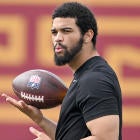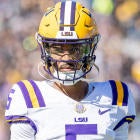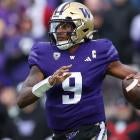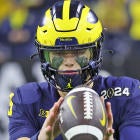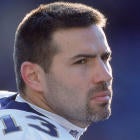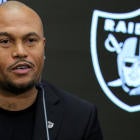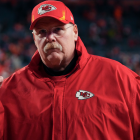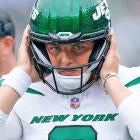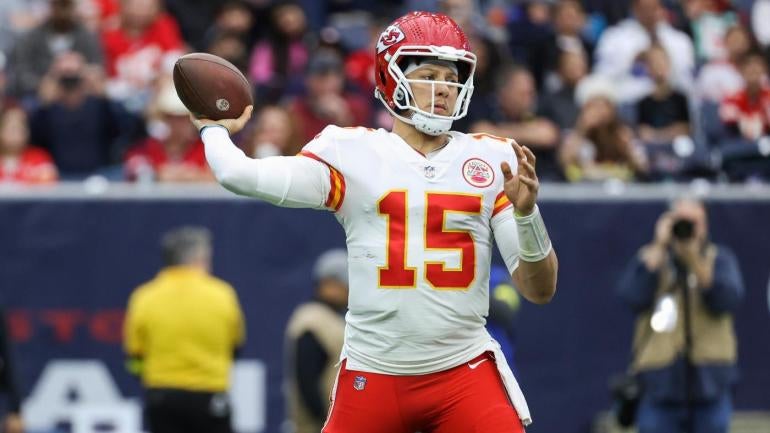
On Feb. 2, 2020, the Kansas City Chiefs joined the list of NFL franchises who have won multiple Super Bowl titles. The Chiefs became the 13th franchise with multiple Vince Lombardi Trophies with their 31-20 victory over the San Francisco 49ers that season. Kansas City's second title came exactly 50 years after its first, as the franchise's loyal fanbase was finally rewarded for its patience.
In a matter of hours, the Chiefs will take on the Philadelphia Eagles in Super Bowl LVII, and with a win Kansas City would become only the 10th NFL franchise with at least three Super Bowl titles. Three titles would put the Chiefs alongside the Broncos, the Commanders, and Raiders in the hierarchy of Super Bowl championship franchises. The Chiefs' Andy Reid can make more history by becoming the first head coach to defeat a team in the Super Bowl that he had previously led to the big game.
Before the Chiefs kick things off against the Buccaneers, we decided to take a look at the franchise's three prior trips to the Super Bowl:
Super Bowl I: Packers 35, Chiefs 10
The Super Bowl was originally known as the "AFL-NFL Championship Game." While several prominent media members referred to the first two AFL-NFL matchups as the Super Bowl, that didn't officially become its name until Super Bowl III. The Super Bowl's name was coined by Chiefs founder Lamar Hunt, who came up with it after watching one of his children play with a "Super Ball," a popular kids toy during that time.
Like the ball, most of the country thought the AFL was mere child's play when compared to the established NFL. But after just a few years, the AFL had become a legitimate threat to the NFL. The AFL's legitimacy grew when NFL commissioner Pete Rozelle agreed to play his league's champion against the AFL's champion at the end of the 1966 season.
Founded in 1960, the AFL served as a refreshing alternative to the run-heavy, defensive dominated NFL. The AFL encouraged passing and higher-scoring games; it was the first professional football league to have a two-point conversion. The AFL also started signing some of college football's biggest games (Joe Namath) and placing them in the biggest markets.
"The AFL attack was wide open," Dave Robinson, a Hall of Fame outside linebacker who was part of the legendary Packers of the 1960s, told CBS Sports in 2020. "They just wanted to run out of different formations with a wide-open offense."
The first AFL Super Bowl representative was the Chiefs, who won their first league title in 1962 under head coach Hank Stram. After going 11-2-1 during the regular season, the Chiefs ran roughshod over the Bills in the AFL Championship Game. But despite their impressive record and a roster that featured several future Hall of Fame players, the Chiefs were not projected to be much of a challenge for the Packers, who were coming off a dramatic NFL Championship Game victory over the Cowboys, Green Bay's fourth NFL title since 1961.
While they didn't have the depth to compete with the Packers, the Chiefs did possess some of the best individual talent of that era. Kansas City's high-scoring offense was led by quarterback Len Dawson, receiver Otis Taylor and running back Mike Garrett, a former Heisman Trophy winner at USC. Kansas City also possessed a star-studded defense, led by future Hall of Famers Willie Lanier, Buck Buchanan, Emmitt Thomas, Bobby Bell and Johnny Robinson.
On a field that featured some of the best players of that era, the star of Super Bowl I was an unheralded receiver named Max McGee, who notoriously partied until the mid-morning hours leading up to the game. After starting receiver Boyd Dowler left the game with an injury, the 34-year-old McGee caught seven passes for 138 yards and two touchdowns after catching just four passes during the '66 season.
The Chiefs held tough in the first half, responding to the Packers' first two touchdowns with two scoring drives of their own. But after taking a 14-10 deficit into intermission, the Chiefs committed a costly error when Dawson, facing the Packers' pass rush, threw an interception to Packers safety Willie Wood, who was tackled at the Chiefs' 5-yard-line. The pick set up the first of three unanswered touchdowns by the Packers.
"We looked at them very carefully in the film, and we realized they had excellent personnel," Robinson said. "The man power was great, really great football players. But they lacked a little bit of the techniques that we were used to. So we had to take advantage of the different techniques. It wasn't so much their fault as it was the rest of the AFL. The defenses weren't that strong in the AFL, and so they had never experienced the things we did and the type of football we bring. We had an advantage right there. That was the big thing going for us.
"After they had inner league play, the Kansas City Chiefs and Oakland Raiders showed their true mettle, and they became very very good teams. All they need was inner league play so they had that experience playing against better defenses."
Adding insult to injury was what Packers legendary coach Vince Lombardi told the press moments after the game.
"I think the Kansas City team is a real tough football team that doesn't compare with the National Football teams," Lombardi said. "That's what you wanted me to say, I said it."
"That irritated us," Dawson said in an NFL Films documentary. "That stuck with us until we had another opportunity to get back to a Super Bowl. That was a motivating factor for us to get a little better so that we could compete against the best."
The Packers' next AFL victim, the Raiders, defeated the Chiefs in the divisional round of the 1968 playoffs. But the Raiders would fall the following week to Namath and the Jets, who would then pull off the greatest upset in pro football history: a 16-7 win over the NFL champion Colts in Super Bowl III.
No. 53: 1966 Super Bowl I - Chiefs vs. Packers "The First AFL-NFL World Championship Game" (Jan. 15, 1967) #NFL100 @packers
— NFL (@NFL) September 28, 2019
📺: NFL 100 Greatest Games on @NFLNetwork pic.twitter.com/cnoPIROXdN
Super Bowl IV: Chiefs 23, Vikings 7
The Chiefs put together another championship run in 1969. They defeated the Jets and Raiders in the playoffs to earn the right to play in Super Bowl IV, the final game ever played between the AFL and NFL.
Despite the Jets' success the previous year, oddsmakers didn't give the Chiefs any shot at upsetting the Vikings, who lost just one game during the '69 season. The Vikings' strength was their "Purple People Eater" defense that featured Alan Page, who in 1971 would become the NFL's first defensive player to earn league MVP honors. While they weren't as big of an underdog as Namath's Jets, the Chiefs entered Super Bowl IV as a 13-point underdog.
"We were the stupid stepchild of professional football," Dawson recalled. "We resented that. That was a motivating factor to us. Because we didn't know too much about the Minnesota Vikings, and fortunately, they didn't know too much about us."
The unfamiliarity certainly didn't bother the Chiefs, who controlled the game from the onset. After three Jan Stenerud field goals gave them a 9-0 lead, a five-yard run by Garrett gave the Chiefs a 16-0 halftime advantage. After the Vikings finally scored to trim their deficit to nine points, a quick pass from Dawson to Taylor put the game on ice.
"I went on a quick count, and we just happened to get lucky," Dawson said of his touchdown pass to Taylor. "They had an all-out blitz coming; they blitzed very seldom. I hit Otis with a little hitch pass. That was the only pass I could have gotten rid of."
While Dawson took home the game's MVP award, the Chiefs' defense overwhelmed the Vikings, forcing five turnovers while limiting the Vikings to just 239 total yards. But the biggest star of the game was Stram, who, unbeknownst to his players, wore a microphone for NFL Films during his team's 23-7 victory.
From his wardrobe to his vocab, Hank Stram was wise beyond his years. #WednesdayWisdom@Chiefs | @Saints pic.twitter.com/feayBSht6A
— NFL Films (@NFLFilms) October 10, 2018
Three years after their loss to the Packers, the Chiefs became the second -- and final -- AFL team to defeat an NFL team, as the leagues merged during the ensuing offseason. And while the win did not elevate the Chiefs to the status of "America's Team," Hunt said that his team did capture the hearts of a certain part of the country.
"We call our team 'Mid-America's Team,'" Hunt said. "We represent Kansas, Missouri, the western half of Missouri, Oklahoma, Arkansasand Nebraska. That's a pretty big area."
On Sunday, Kansas City will try to punch a ticket back to the Super Bowl.
— NFLonCBS (@NFLonCBS) January 17, 2020
In their last trip, the @Chiefs took down the Vikings in Super Bowl IV. pic.twitter.com/P73ndjMEv0
Super Bowl LIV: Chiefs 31, 49ers 20
It was the sting of a wasp that finally awoke the Chiefs' beastly offense. Trailing 20-10 with 7:13 left in Super Bowl LIV, Patrick Mahomes asked his offensive coordinator a question. The question was posed as officials were reviewing a pass completion from Mahomes to Tyreek Hill.
"We have time to run wasp?" Mahomes asked offensive coordinator Eric Bieniemy. Bieniemy signed off on Mahomes' idea, despite the officials overturning Mahomes' pass to Hill. Mahomes would run his proposed play with the Chiefs facing a third-and-15 on their own 35-yard-line.
"It's such a long-developing play," Mahomes said. "With that pass rush, we were going to have to have great protection."
Though he was hit on the play, Mahomes had just enough time to get the ball to Hill, who separated himself from the 49ers' defense before hauling in the pass. The 44-yard completion set up Mahomes' one-yard touchdown pass to Travis Kelce. After a stand by the Chiefs' defense, a 38-yard completion from Mahomes to Sammy Watkins set up Mahomes' five-yard touchdown pass to Damien Williams.
Down 10 in the 4th, the @Chiefs were running out of time... Then @PatrickMahomes and @cheetah gave KC new life 🔥
— FOX Sports: NFL (@NFLonFOX) May 1, 2020
📺:Rewatch Super Bowl LIV, TOMORROW at 8:00PM ET on FOX pic.twitter.com/BCZBguoGiG
Protecting a lead for the first time since the second quarter, the Chiefs' defense came up with another stop after Jimmy Garoppolo just missed Emmanuel Sanders on pass that would have given the 49ers the lead. On fourth down, Garoppolo was sacked by Frank Clark, as the Chiefs' defense came up with critical stops on consecutive possessions.
"Felt like at that moment, the whole world knew that the Kansas City Chiefs actually do play defense," said All-Pro safety Tyrann Mathieu.
Two plays after Clark's sack, Williams, behind a key block from fullback Anthony Sherman, rumbled down the far sideline for the game-clinching score.
Damien Williams 38 yard TD run Super Bowl LIV. #ChiefsKingdom #SBLIV #SuperBowlChamps pic.twitter.com/V4PkvYEKAC
— DrMarioPepper (@DrMarioPepper) February 3, 2020
The score capped off the Chiefs' first Super Bowl win in 50 years. It was also a defining moment for Andy Reid, who was finally able to hoist the Lombardi Trophy after over two decades as an NFL head coach.
"Going into that year, for him not to have a ring, was unfathomable," Kelce said of Reid. "A guy that amazing at his job. It put a chip on everybody's shoulder in the building to go out there and get one for him."
The win was also an historic moment for Mahomes, who became the first player to win Super Bowl and league MVP honors before his 25th birthday.
Super Bowl LV: Buccaneers 31, Chiefs 9
With a win in Super Bowl LV, Mahomes would have become the youngest quarterback with two Super Bowl rings. Instead, Mahomes fell short against a the quarterback who continues to hold that record: Tom Brady.
Mahomes, playing behind a banged-up offensive line, spent the majority of the night on the run. Conversely, Brady picked up his fifth Super Bowl MVP trophy after throwing three touchdowns on 21-of-29 passing. Brady threw two first-half touchdown passes to former Patriots teammate Rob Gronkowski, as Tampa Bay took a 21-9 lead at intermission.
The Chiefs started the second half with a field goal but fell further behind when Leonard Fournette raced 27 yards to pay dirt. Kansas City never really threatened again while becoming the fifth team in Super Bowl history not to score an offensive touchdown.
#SuperBowl LV
— Kevin Gallagher (@KevG163) February 8, 2023
Playing on their home turf — #Tampa's Raymond James Stadium, the #Buccaneers steamroll the favored #Chiefs, 31-9.
Tom Brady (3 TD), Leonard Fournette (135 total yards, TD), and a rugged defense (3 sacks, 2 INT) clinch the #Bucs' second ring.
Two years ago tonight pic.twitter.com/Pyg1BcHDx1














